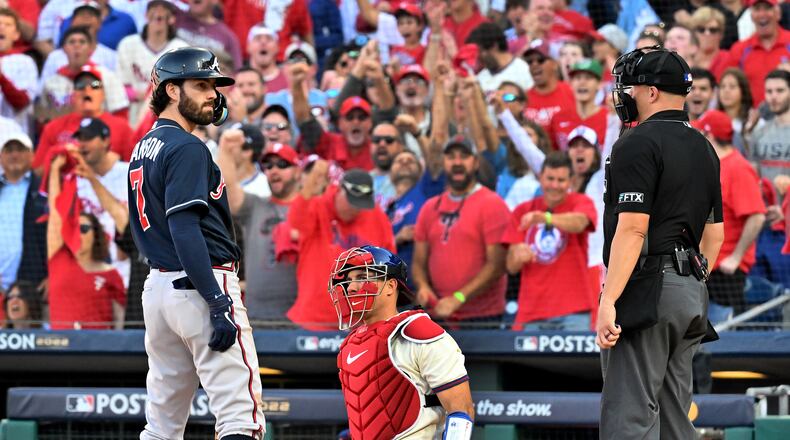PHILADELPHIA — The Braves’ attempt to defend their World Series title ended with an 8-3 loss to the Phillies in Saturday’s deciding Game 4 of the National League Division Series.
The run ended because the Braves simply couldn’t put together enough hits in most of the series.
In Saturday’s defeat at Citizens Bank Park, the Braves never put a runner into scoring position. Three of their four hits were solo home runs by Orlando Arcia in the third inning, Matt Olson in the fourth and Travis d’Arnaud in the seventh.
Not being able to hit is a simple explanation for a complicated and unexpected problem. The Braves clobbered most opponents in winning the NL East this season with a team batting average of .253, ninth best in MLB, and .268 with runners in scoring position, sixth best in baseball.
But in four games against the Phillies, who had a team ERA of 3.97 and an opponents’ batting average of .245 during the regular season, the Braves hit .180, including .273 with runners in scoring position. That average dropped to .167 in the losses.
“We ran into a really hot team,” Braves manager Brian Snitker said. “I mean, they’re hitting on all cylinders, are playing great baseball. They shut us down offensively. All the credit goes to the Phillies. I mean, they came in here, and I’ve got to say, they got hot at the right time and played a heck of a series.”
Among the surprising lack of producers were Dansby Swanson, Austin Riley and rookie Michael Harris. They combined for four hits in 35 at-bats. Swanson had the trio’s one extra-base hit, a double, and Riley and Harris produced their only two RBIs. During the regular season they combined for 82 home runs and 104 more extra-base hits.
“I didn’t show up,” said Riley, who hit 38 home runs with 93 RBIs during the season. “I let my team down, let the fans down. And it’s something that I’m gonna have to deal with this offseason, and it sucks more than anything.”
The only hitters who were consistent in the series were d’Arnaud (.375, two home runs, five RBIs), Olson (.333, two home runs, five RBIs), Ronald Acuña (.333) and Arcia (.300). The quartet combined for 18 of the team’s 23 hits. The rest of the team went 5-for-75 in the series.
“We were never able to get a big hit when it mattered,” said Swanson, who hit .277 with 25 home runs during the regular season. “They did. And that’s the way baseball sometimes is, it’s tough because you play 162 games to get to this point. And then anything can happen from October and it’s just not a lot of fun.”
Snitker credited the Phillies’ pitching staff. The Phillies’ relievers, who were a concern before the series, allowed only four earned runs in 14-1/3 innings pitched.
“The pitching coaches and I sat down in the last couple of days and really talked about how we’re going to do this and different scenarios,” Phillies manager Rob Thomson said. “Everybody pitched well. I mean, you can have the greatest plan in the world, but if somebody doesn’t pitch well, then it goes out the window. Everybody pitched well, and it went really well.”
While the Braves struggled to string together hits, the Phillies hit .271, including .371 with runners in scoring position.
“They were all ready to hit and didn’t miss any of their pitches, did damage, played small ball when they needed to, move runners over when they needed to, got the big hits when they needed to with runners on,” d’Arnaud said.
About the Author



